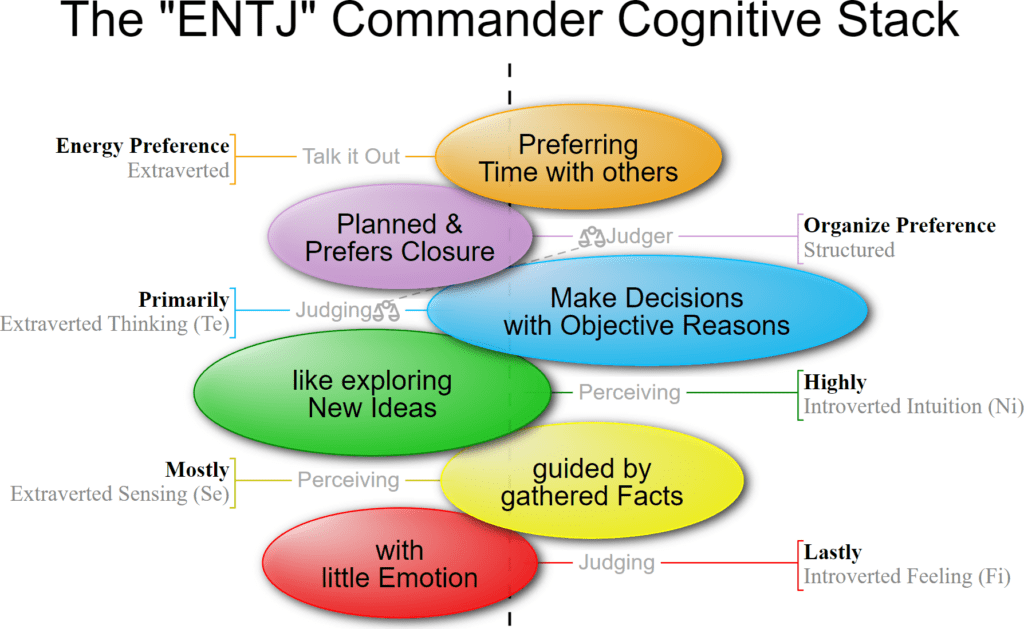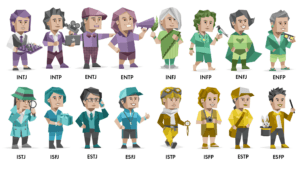What is the MBTI ENTJ “Commander” Personality Type?

People with the ENTJ Personality Type are natural-born leaders and embody the gifts of charisma and confidence.
Commanders project authority in a way that draws crowds together behind a common goal and is results-oriented.
With Extraverted Thinking as their dominant and top extraverted function, Commanders are Judges. They use objective reasoning when making decisions with little emotion from their Introverted Feelings, which are their lowest function.
However, they are also often characterized as ruthless, using their drive, determination, and sharp minds to achieve whatever end they’ve set for themselves.
They are forward-thinking with their Introverted Intuition, looking for deep connections and patterns.

Commanders like to gather the facts with their Extraverted Sensing.
Commanders are extraverted, preferring time with others to discuss things. They are structured, like to plan, and prefer closure.
Commanders are “Abstract Judgers” with Introverted Intuition and Extraverted Thinking. When threatened, they will use a more abstract way of proving that you have done something wrong. And they may behave with the Blammer Satir Communication Style.
ENTJ Personality Type cross-reference
- Keirsey Type – Field Marshal
- Temperament Type – Choleric
- Animal Type – Lion
- DISC Type – Dominant
- Socio-Communicative Type – Driver
- True Colors – Green
- Color Code – Red
- Personality Compass – North
- Occupational Type – Enterprising
- Learning Type – Activist
- Leadership Type – Dominator
Enneagram Types
The Enneagram is a Personality Typing System comprising nine different types.

Dominant Function – Extraverted Thinking
- This is a preferred function and is expressed through how they make decisions and judgments.
- They tend to speak first without listening, making snap judgments before taking in all the information about a situation.
- While they tend to make snap judgments, they are also very rational and objective.
- They focus on imposing order and standards on the world around them.
- Therefore, setting measurable goals is essential.
Auxiliary Function – Introverted Intuition
- People with this personality type are future-focused and always consider the possibilities when deciding.
- They are forward-thinking and are not afraid of change.
- They trust their instincts, although they may regret jumping to conclusions quickly.
Tertiary Function – Extraverted Sensing
- This cognitive function gives them an appetite for adventure.
- They enjoy novel experiences and may sometimes engage in thrill-seeking behaviors.
- Because of their outward sensory focus, they also appreciate beautiful things.
- They often enjoy surrounding themselves with beautiful or interesting things.
Inferior Function – Introverted Feeling
- Introverted feeling is centered on internal feelings and values.
- Emotions can be difficult for them, and they often do not understand how this part of their personality contributes to their decision-making process.
- When this aspect of nature weakens, people may feel uncomfortable or awkward in settings where an emotional response is required.
ENTJ Traits
ENTJs are decisive, strategic, and natural leaders who enjoy spending time with others. They have strong verbal skills, and interacting with others helps them feel energized.
They prefer to think about the future rather than focus on the here and now and usually find abstract and theoretical information more attractive than concrete details.
They emphasize objective and logical information more when making decisions. Personal feelings and the emotions of others tend not to factor much into their choices.
They find themselves in charge because they are inclined to give structure to a project. And rather than establishing plans, they look ahead and set goals.
They have no problem with conflict, but they may appear argumentative, tend to be confrontational, and come across as aggressive.
Strengths
- Strong leadership skills
- Self-assured
- Well-organized
- Good at making decisions
- Assertive and outspoken
- Strong communication skills
Weaknesses
- Impatient
- Stubborn
- Insensitive
- Aggressive
- Intolerant
ENTJ Relationships
Friendships
- They are social people and love engaging in conversations.
- While they can seem argumentative and aggressive sometimes, remember that this is part of their communication style.
- Try not to take it personally.
- They tend to have the most effortless friendships with people who share their interests and views.
- They may struggle to understand very introverted, sensitive, or emotional people.
Personal Relationships
- Since they are extraverts, they gain energy from socializing (unlike introverts, which expend energy in social situations).
- They love having passionate and lively conversations and debates.
- Sometimes, other people can feel intimidated by their confidence and solid verbal skills.
- When they have a good idea, people with this personality type feel compelled to share their points of view with others.
- Despite their verbal abilities, they are not always good at understanding other people’s emotions.
- Expressing emotions can be difficult for them sometimes, and their tendency to get into debates can make them seem aggressive, argumentative, and confrontational.
- People can overcome this problem by consciously thinking about how others might feel.
- They may struggle to understand or get along with more sensitive personality types.
- While they are extraverts but not emotionally expressive, others may see them as insensitive.
Partner Relationships
- They can often seem quite dominating in a relationship.
- Because dealing with emotions does not come naturally to them, they may seem insensitive to their partner’s feelings.
- It is essential to remember that this does not mean they don’t have feelings—they need to feel completely comfortable showing their emotions.
- They are committed to making relationships work and always look for ways to improve them.
- If you have an issue with your partner, be upfront and honest.
- Your partner would rather hear the truth than try to guess your feelings.
Parenting
- Parents of ENTJ children should recognize their child is independent and intellectually curious.
- You can help your child by allowing them to pursue their curiosity.
- Understand that your child will often need your reasoning explained to understand why specific rules must be followed.
- You can also help your child develop emotional understanding by talking openly about feelings.
- Point out how people might feel about different experiences so that your ENTJ child can better interpret their emotions and those of others.
ENTJ Careers
- Thanks to their comfort in the spotlight, ability to communicate, and tendency to make quick decisions, ENTJs naturally fall into leadership roles.
- These individuals sometimes take control of a group without knowing how they came to be in such a position.
- Because of their love for structure and order, the ENTJ is also good at supervising and directing others.
- They help groups complete tasks and achieve goals.
- They can quickly see what needs to be accomplished, develop a plan of action, and assign roles to group members.
- ENTJs do best in careers with a lot of structure, but it is ideal that they have plenty of room for various jobs that allow them to meet and interact with many people.
- People of this type bring many desirable skills, including excellent leadership and communication skills, a hard-working attitude, and an ability to plan for the future.


